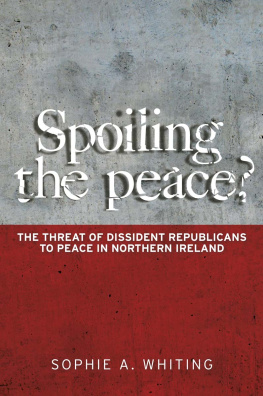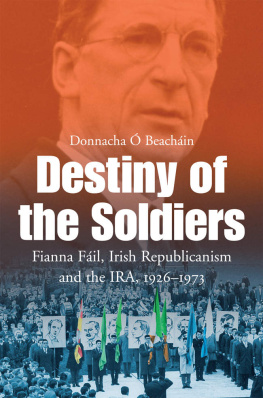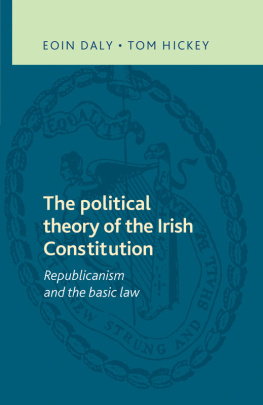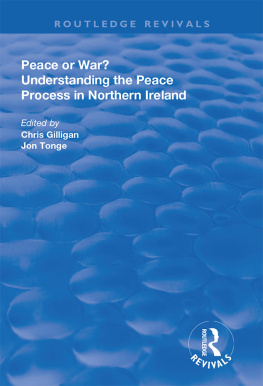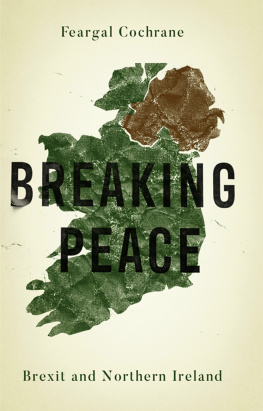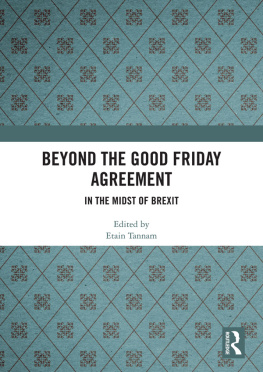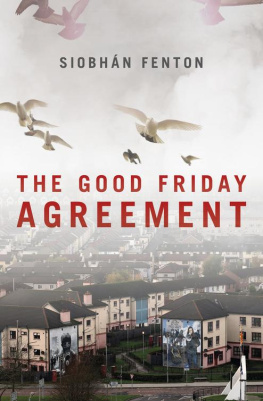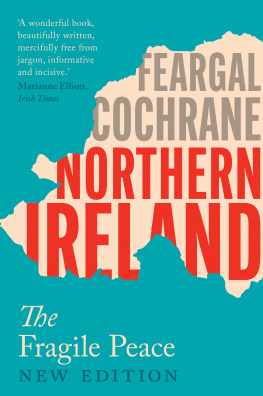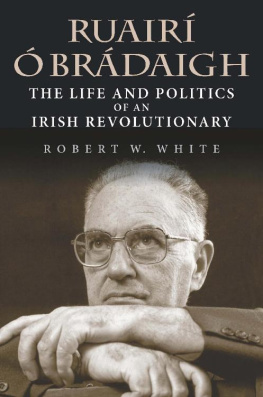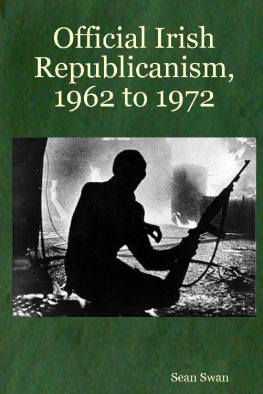Spoiling the peace?
The threat of dissident Republicans to peace in Northern Ireland
S.A. WHITING
Manchester University Press
Copyright S.A. Whiting 2015
The right of S.A. Whiting to be identified as the author of this work has been asserted by her in accordance with the Copyright, Designs and Patents Act 1988.
Published by Manchester University Press
Altrincham Street, Manchester M1 7JA
www.manchesteruniversitypress.co.uk
British Library Cataloguing-in-Publication Data
A catalogue record for this book is available from the British Library
Library of Congress Cataloging-in-Publication Data applied for
ISBN 978 0 7190 9572 6 hardback
First published 2015
The publisher has no responsibility for the persistence or accuracy of URLs for any external or third-party internet websites referred to in this book, and does not guarantee that any content on such websites is, or will remain, accurate or appropriate.
Typeset in 10.5/12.5 Adobe Garamond by Servis Filmsetting Ltd, Stockport, Cheshire
Contents
Figures and tables
Figures
The roots of Irish republicanism since 1969
Cycle of crisis and response
Tables
Purist versus pragmatist conceptions of Irish republicanism
Number of person and vehicle searches under Section 44 of the Terrorism Act
Acknowledgements
I would like to express my appreciation to all the interviewees in this book who took the time to offer their insight and warmly welcomed my enquiries. Without such openness I would have never been able to carry out this project.
I would also like to thank all at Manchester University Press for supporting this publication.
Glossary and abbreviations
| 32CSM | 32 County Sovereignty Movement. Political organisation, created in 1997. Linked to the RIRA. |
| ANC | African National Congress |
| Ard Chomhairle | National executive of a political party |
| Ard Fheis | Annual conference |
| CABHAIR | A republican prisoner association. Linked to RNU. Translated to assistance. |
| CIRA | Continuity IRA. Republican paramilitary organisation linked to RSF. |
| Cogs | A republican prisoner association. Translates to conscience. |
| Dil ireann | Lower house of the Irish parliament |
| DDR | Disarmament, Demobilisation and Reintegration |
| DEA | District Electoral Area |
| DUP | Democratic Unionist Party |
| irg | Socialist Irish republican political party, created in 2006 |
| GFA | Good Friday Agreement. Also referred to in this book as the Agreement. |
| IMC | Independent Monitoring Commission |
| INLA | Irish National Liberation Army. Republican Socialist paramilitary organisation, created in 1974 over split in the Official republican movement. |
| IRA | Irish Republican Army |
| IRPWA | Irish Republican Prisoners Welfare Association |
| IRSP | Irish Republican Socialist Party. Irish republican socialist party formed in 1974 after splitting from the Official movement. Formerly linked to the paramilitary group INLA. |
| LVF | Loyalist Volunteer Force |
| MI5 | Military Intelligence Section 5. British internal security services. |
| MLA | Member of Legislative Assembly |
| NILT | Northern Ireland Life and Times |
| Official IRA | Republican paramilitary organisation, linked to the Official republican movement. |
| ONH | glaigh na hireann/Soldiers of Ireland. Title claimed by various republican factions. |
| PIRA | Provisional IRA. Republican paramilitary organisation, created in 1969/70. Linked to Provisional Sinn Fin, fully decommissioned in 2005. Also referred to in this book as the IRA. |
| PSNI | Police Service of Northern Ireland. Successor police force to RUC, created in 2001. |
| RAAD | Republican Action Against Drugs. Republican paramilitary organisation operating mainly in the Derry area. Engage in violence against suspected drug dealers and other anti social behaviour. |
| RIRA | Real IRA. Republican paramilitary organisation formed in 1997 by those unhappy with the direction of the peace process, particularly the Mitchell Principles. |
| RNU | Republican Network for Unity. Irish republican organisation opposed to the direction of the peace process. |
| RUC | Royal Ulster Constabulary. The former police service, replaced by the PSNI in 2001. |
| RSF | Republican Sinn Fin. Republican organisation. Split from the Provisional movement in 1986 over the dropping of abstention from Dil ireann. |
| SDLP | Social Democratic and Labour Party |
| Sinn Fin | Irish republican political party. Also referred to as the Provisional movement to differentiate between RSF and to collectivise the PIRA and Sinn Fin. |
| Taoiseach | Irish Prime Minister |
| Teach na Filte | A republican prisoner association linked to the IRSP |
| UUP | Ulster Unionist Party |
Introduction
Those who defend status quo relationships of power, or see them as natural and normal, tend to treat any opposition or critique as tantamount to treason or terrorism. That another world is possible, to invoke a popular refrain, is nothing less than an ontological challenge to the world that is today.1
As various organisations strive to display their loyalty to the principles of national independence and allegiance to their republican forefathers who provided impetus to the struggle for Irish sovereignty, the centenary commemorations in 2016 of the Easter Rising are set to reflect the multifaceted nature of modern day Irish republicanism. Yet the claim to the mantle of true republicanism, as supposedly embodied in those involved in the Rising, remains contested. Competing military and political organisations emerged in what became the Irish Republic, whilst militarism as a tool of Irish republicanism remained in the form of a continuing Irish Republican Army, which was concentrated predominantly in Northern Ireland. For decades, Irish state ideology viewed the North as illegally occupied by the British government, yet rejected the claims of legitimacy of successor IRAs to the 191623 version. Dissidence over what constitutes the IRA, the legitimacy of armed struggle and the extent to which British sovereignty over Northern Ireland ought to be acknowledged has long been evident.
The movement of Sinn Fin from the position of abstention to recognising and participating in Dil ireann and the Northern Ireland Assembly, accompanied by the removal of the partys army, the Provisional IRA, revived the tensions over compromise evident within the republican movement early in the twentieth century. Dissenting voices against the compromises of Provisional Irish republicanism were evident from the mid-1980s and became more significant from the 1990s onwards.2
Most peace processes generate organisational divisions. The Taoiseach at the time of the 1998 Good Friday Agreement (GFA), Bertie Ahern, commented: It is an observable phenomenon in Northern Ireland, and elsewhere, that tension and violence tend to rise when compromise is in the air.3 Within peace processes more generally the groups involved in negotiations are rarely the monoliths presented by their opponents, but instead, are described as complex organisms that perform different functions and provide umbrellas for different interests.4 It is during ceasefire periods that these interests diffuse and fragment. This observation, combined with the republican movements volatile nature, indicates the likelihood that the Northern Irish peace process at the end of the twentieth century and the compromises involved would produce dissenting voices.

